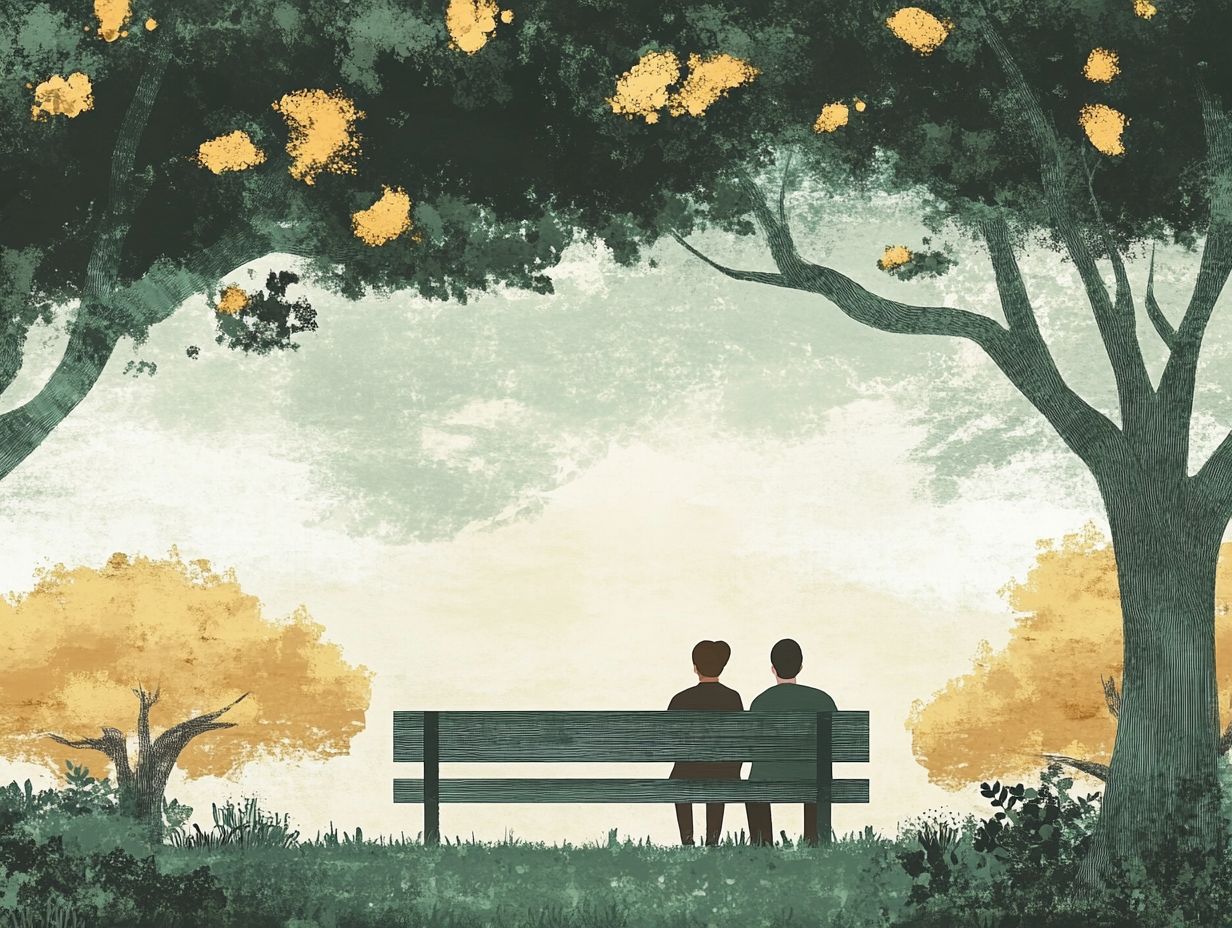Dealing with the emotional rollercoaster of cancer involves navigating a complex array of emotions like fear, anxiety, anger, sadness, and grief. These feelings often arise from the uncertainty of diagnosis, treatment side effects, and the overall impact on life, provoking worry and stress.
Understanding these emotional responses is crucial for cancer patients and their families. Establishing robust coping mechanisms, including mindfulness and resilience, can significantly aid in managing the emotional challenges associated with cancer.
Support systems, including counseling, cognitive-behavioral therapy, and social support groups, play a vital role in providing emotional validation and connection with individuals facing similar experiences.
Adopting self-care practices such as mindfulness meditation, regular exercise, and maintaining a healthy lifestyle also supports emotional resilience, helping individuals find hope and positivity amid the challenges of a cancer diagnosis.
For a comprehensive approach, exploring therapy options like cognitive-behavioral therapy can enhance mental health and well-being. Consulting a therapist can equip patients with strategies to cope effectively with emotional stress, fostering a sense of control and understanding.
Key Takeaways:
The Emotional Impact of Cancer

Cancer’s emotional impact includes fear, anxiety, stress, and sadness, often leading to depression.
Patients and families experience these emotions due to treatment uncertainty and side effects, which can affect their relationships and routine.
Effective coping mechanisms and support from healthcare providers are essential in managing the emotional challenges of cancer.
Understanding the Emotional Side of Cancer
Understanding the emotional side of cancer involves recognizing emotions like fear, anger, and sadness that arise during diagnosis and treatment. These emotions can lead to feelings of guilt or loneliness.
Cancer affects mental health, impacting coping strategies and quality of life. Spirituality or faith can also provide comfort during these times.
Support systems, including counseling and support groups, help individuals manage these emotions and connect with others who understand their experiences, fostering a sense of community and shared experiences.
Common Emotions Experienced During Cancer
Common emotions experienced during cancer include fear, anxiety, anger, sadness, and grief. Such emotions can sometimes lead to depression if not addressed.
These emotions result from treatment side effects, prognosis uncertainty, and healthcare system stress, affecting both the patient and their family.
Recognizing emotions helps in developing effective coping strategies and improving communication with healthcare professionals.
Fear and Anxiety
Fear and anxiety are common emotions among cancer patients, often triggered by concerns about disease impact, treatment outcomes, and future uncertainty. These feelings can create additional stress and worry.
Medical appointments and discussions about prognosis and treatments like chemotherapy can intensify these emotions.
Mindfulness practices, exercise, and support groups help manage fear and anxiety, providing a sense of control and hope.
A strong support system of friends, family, or professionals provides comfort to cancer patients, helping them navigate these emotional experiences.
Anger and Frustration
Anger and frustration are common during a cancer journey due to diagnosis challenges, treatment side effects, and disease limitations.
Treatment side effects like fatigue, pain, and cognitive changes disrupt routines and reduce quality of life.
Financial burdens from medication costs and income loss increase stress and helplessness.
Coping strategies like mindfulness, therapy, and support groups help manage these emotions.
Emotional support from family, friends, and healthcare providers alleviates negative feelings and promotes resilience.
Sadness and Grief

Sadness and grief are emotional reactions commonly experienced by cancer patients and their families due to the illness and potential changes in life, fostering feelings of loneliness.
These emotions involve mourning potential losses and altered routines, affecting spiritual and mental well-being.
Connecting with family, friends, and mental health professionals can provide emotional support and coping strategies, reinforcing social support and connection.
Ways to Cope with Emotional Challenges
Coping with emotional challenges, especially with cancer, involves seeking support from friends, family, and support groups. Communication with loved ones and healthcare providers is key to understanding emotional needs.
Practicing self-care, such as maintaining a healthy diet, exercising, and getting adequate rest, is crucial in managing emotions effectively.
Exploring therapy options, including counseling, cognitive-behavioral therapy (CBT), and mindfulness techniques, helps improve mental health and resilience, fostering a positive outlook.
Seeking Support
Seeking support is essential for cancer patients to manage emotional stress and gain strength through family, friends, and healthcare providers.
Support involves accessing emotional validation, joining support groups for shared experiences, and utilizing community resources for counseling and education.
Effective communication in seeking support helps cancer patients build resilience and find hope during their treatment journey.
Practicing Self-Care
Practicing self-care is important for cancer patients as it enhances emotional health and builds resilience.
Self-care strategies include:
- Mindfulness meditation to manage stress and anxiety
- Regular physical activity to improve mood and stamina
- Focusing on nutrition for body strength and recovery
These practices help cancer patients manage emotional challenges and develop effective coping strategies.
Exploring Therapy Options
Therapy options for cancer patients include cognitive-behavioral therapy, individual therapy, and group therapy.
Cognitive-behavioral therapy helps patients manage emotions and mental health.
Individual therapy provides personalized attention to explore feelings and fears.
Group therapy offers community support and connection with others facing similar challenges.
Therapists equip patients with coping strategies to enhance well-being and resilience during cancer treatment.
Finding Hope and Positivity

Finding hope and positivity during a cancer diagnosis involves focusing on supportive relationships, setting achievable goals, and engaging in activities that bring joy and comfort. Spirituality and faith can also play a role in maintaining hope.
Hope and positivity enhance emotional resilience and improve the ability to cope with treatment challenges, fostering a sense of gratitude and control.
Focusing on the Present
Focusing on the present through mindfulness helps cancer patients build resilience and cope with uncertainty.
Mindfulness techniques, including deep breathing, body scans, and guided imagery, enhance self-awareness and emotional regulation.
Practicing mindfulness daily reduces anxiety and promotes calmness and clarity.
Finding Meaning and Purpose
Finding meaning and purpose during a cancer journey involves strengthening relationships, engaging in personal growth activities, and maintaining a hopeful outlook.
Patients can enhance emotional resilience by connecting with family, friends, and support groups, practicing mindfulness, and journaling to redefine life purpose.
Frequently Asked Questions
What is the emotional rollercoaster of cancer?
The emotional rollercoaster of cancer refers to the intense and fluctuating emotions that individuals experience when faced with a cancer diagnosis, treatment, and survivorship. It can include feelings of fear, sadness, anger, anxiety, and hopelessness.
How can I cope with the emotional rollercoaster of cancer?

There is no one-size-fits-all solution, but some ways to cope with the emotional rollercoaster of cancer include seeking support from loved ones, joining a support group, practicing self-care, and seeking professional help if needed.
Why is it important to address the emotional aspect of cancer?
The emotional aspect of cancer is just as important as the physical because it can impact treatment outcomes, overall well-being, and quality of life. Ignoring or suppressing emotions can also lead to long-term psychological distress.
Can cancer treatment affect my emotions?
Yes, cancer treatment can affect your emotions due to the physical changes in your body, side effects of treatment, and the stress of managing a serious illness. Hormonal changes and certain medications may also contribute to emotional changes, impacting your mental health and routine.
How do I communicate my emotional needs to my healthcare team?
It is important to be open and honest with your healthcare team about your emotional needs. Effective communication can help them provide the necessary support. They are trained to support you in all aspects of your cancer journey and can provide resources, information, and referrals if needed, enhancing your emotional support network.
What are some self-care practices that can help with the emotional rollercoaster of cancer?
Self-care practices such as exercise, meditation, journaling, and spending time in nature can help manage stress, improve mood, and promote overall well-being. It is important to find what works best for you and make it a priority in your daily routine.





